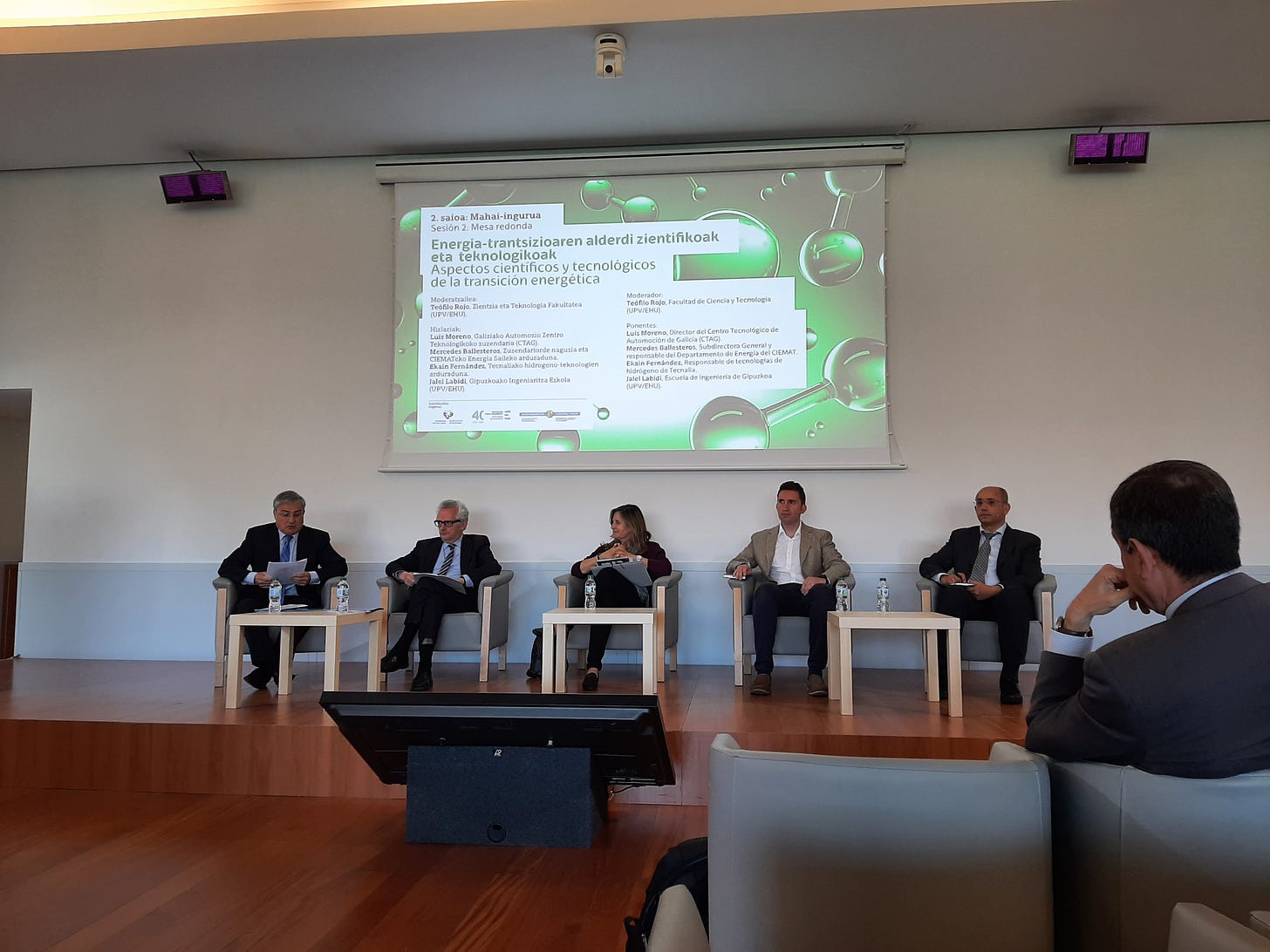23) Spertus - 2º Seminario Permanente de Transición Energética y Competitividad Industrial
El día 9 de Mayo de 2022 tuve el placer de poder acudir presencialmente al 2º Seminario Permanente de Transición Energética y Competitividad Industrial (SPERTUS) en Bilbao, organizado por la UPV/EHU y EVE.
En la sesión titulada “Visión global de la transición energética”, destacaría las palabras de Luis Cabra de Repsol, donde expreso su malestar porque la regulación europea debería promover, en vez de prohibir que tecnologías puedan ayudar a la descarbonización. Considera injusto que en los vehículos propulsados con los combustibles sintéticos con emisiones netas 0, no se consideren verdes, haciendo alusión a que la Unión Europea está señalando quien será el ganador, el coches eléctrico de baterías (BEV).
En la 2º sesión diversos expertos han tratado el tema “Aspectos científicos y tecnológicos de la transición energética” donde Ekain Fernandez ha hablado de los retos y oportunidades del hidrógeno, destacando la necesidad de proyectos demostrativos en colaboración.
En la 3º mesa redonda, “Aspectos industriales de la transición energética”, me gustaría de destacar una nota clave que ha trasladado Alex Belaustegui Foronda de Ingeteam. Los grandes actores del sector eólico están en pérdidas (aún siendo una tecnología madura y con mucho futuro, porque el precio esta ajustadísimo), y que ello está tensionando aguas abajo en todos los márgenes de la cadena de suministros. En muchos caso, los costes del País Vasco, les dificulta competir con los países BCC (best cost countrys) como India, China, Vietman… siendo necesario aumentar la productividad para tener oportunidad.
La off shore puede ser una tecnología liderada por Europa, asimismo, en la costa este de USA hay previstos parques offshore, pero es plausible que los componentes tengan que ser construidos en allí.
Mikel González-Eguino ha advertido en debate titulado “Aspectos transversales de la transición energética”, que según un informe la CE del 2018, el País Vasco pueda sufrir un declive en el empleo derivado de la transición energética, dado que Euskadi posee una industria de gran consumo de energía y de fabricación de componentes para automóviles de ICE.
Finalmente, el Coronel Jose Ramon Pardo de Santayana, analista del Instituto de Estudios Estratégicos del Ministerio de Defensa de España dio un baño de realidad al auditorio, advirtiendo de que “Mientras haya guerra en Europa, será la prioridad”.
En la vuelta a mi casa tras la jornada, me quedo el pensamiento que la transición energética es un reto mayúsculo, dado que si la implementamos muy rápido (además de asumir riesgo en la elección entre la variedad de tecnologías disponibles) perderemos competitividad a nivel industrial, abocándonos a la desindustrialización. En contrapartida, si llegamos tarde ni seremos lideres tecnológicos ni tendremos ventajas competitivas respecto a otros países.
Felicidades a Téofilo Rojo y Luis Miguel Varela Cabo por la organización de tan interesante jornada. Mucha suerte en el 3º seminario en Oporto.
23) Spertus - 2nd Permanent Seminar on Energy Transition and Industrial Competitiveness
On May 9, 2022, I had the pleasure of being able to attend the 2nd Permanent Seminar on Energy Transition and Industrial Competitiveness (SPERTUS) in Bilbao, organized by the UPV/EHU and EVE.
In the session entitled "Global vision of the energy transition", I would highlight the words of Luis Cabra from Repsol, where he expressed his discomfort that European regulations should promote, instead of prohibit, technologies that can help decarbonisation. He considers it unfair that vehicles powered by synthetic fuels with net 0 emissions are not considered green, alluding to the fact that the European Union is pointing out who will be the winner, battery electric cars (BEV).
In the 2nd session, various experts have discussed the topic "Scientific and technological aspects of the energy transition" where Ekain Fernandez has spoken about the challenges and opportunities of hydrogen, highlighting the need for collaborative demonstration projects.
In the 3rd round table, "Industrial aspects of the energy transition", I would like to highlight a key note that Alex Belaustegui Foronda from Ingeteam has transferred. The big players in the wind sector are at a loss (even though it is a mature technology with a great future, because the price is extremely tight), and this is putting pressure downstream on all margins of the supply chain. In many cases, the costs of the Basque Country make it difficult for them to compete with BCC countries (best cost countries) such as India, China, Vietnam... being necessary to increase productivity to have an opportunity.
The off shore may be a technology led by Europe, likewise, offshore parks are planned on the east coast of the USA, but it is plausible that the components have to be built there.
Mikel González-Eguino has warned in a debate entitled "Cross-cutting aspects of the energy transition", that according to a 2018 EC report, the Basque Country may suffer a decline in employment derived from the energy transition, given that the Basque Country has an industry of energy-intensive and automotive component manufacturing for ICE.
Finally, Colonel Jose Ramon Pardo de Santayana, an analyst at the Institute for Strategic Studies of the Ministry of Defense of Spain, gave the audience a reality check, warning that "as long as there is a war in Europe, it will be the priority."
When I return home after the day, I am left with the thought that the energy transition is a major challenge, given that if we implement it very quickly (in addition to assuming risk in the choice between the variety of available technologies) we will lose competitiveness at an industrial level. , leading us to deindustrialization. On the other hand, if we arrive late, we will neither be technological leaders nor will we have competitive advantages over other countries.
Congratulations to Téofilo Rojo and Luis Miguel Varela Cabo for organizing such an interesting day. Good luck in the 3rd seminar in Porto.






